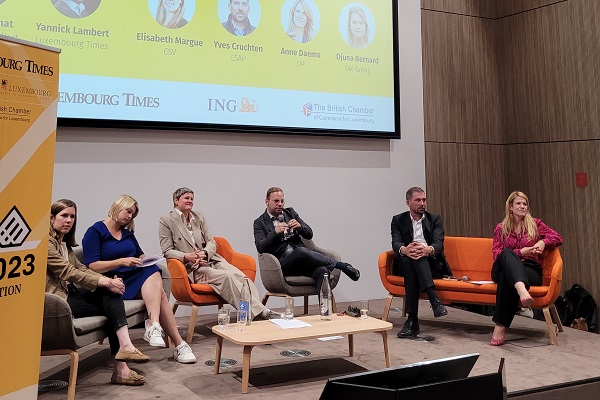 (L-R) Elisabeth Margue (CSV); Djuna Bernard (Greens); Ines Kurschat (moderator); Yannick Lambert (moderator); Yves Cruchten (LSAP); Anne Daems (DP);
Credit: Jazmin Campbell/Chronicle.lu
(L-R) Elisabeth Margue (CSV); Djuna Bernard (Greens); Ines Kurschat (moderator); Yannick Lambert (moderator); Yves Cruchten (LSAP); Anne Daems (DP);
Credit: Jazmin Campbell/Chronicle.lu
On the evening of Thursday 6 July 2023, the American Chamber of Commerce in Luxembourg (AMCHAM), together with Luxembourg Times, the British Chamber of Commerce for Luxembourg (BCC), the Romania Luxembourg Business Forum (ROMLUX) and the Luxembourg Bankers Club, held a second English-language debate dedicated to this year's elections at ING in Luxembourg-Gare.
Whilst the first event (in April) focused on the municipal (local) elections, Thursday's event was devoted to the upcoming legislative (national) elections (8 October 2023) and centred around the idea of what becoming a nation of one million people would mean for Luxembourg.
Following introductions by representatives of ING, BCC and AMCHAM, journalists Ines Kurschat and Yannick Lambert moderated a panel discussion featuring politicians from Luxembourg's four largest political parties, namely: Elisabeth Margue of the Christian Social People's Party (CSV); Djuna Bernard of the Greens (Déi Gréng); Yves Cruchten of the Luxembourg Socialist Workers' Party (LSAP); Anne Daems of the Democratic Party (DP).
The hot topics on the agenda - all linked to this question of Luxembourg's future population reaching one million - were economic growth, bureaucracy and (simplified) procedures, the cost of living crisis, affordable housing, and education.
The four panellists agreed that Luxembourg needs growth, not least to support pensions and the social system. The term "sustainable growth" came up often, with Djuna Bernard (Greens) emphasising the need to better organise growth, namely how the country deals with its resources. Yves Cruchten (LSAP) noted that we often talk about the negative consequences of growth, but growth is still needed; he acknowledged the importance of the financial centre but stressed that his party also wants to "keep some industrial activity in Luxembourg". Anne Daems (DP) agreed with the need for sustainable growth, with adapted infrastructure and innovation linked with increasing productivity; she spoke of the need to develop growth qualtitatively.
Regarding bureaucracy and procedures, there was agreement that further simplification, particularly through digitalisation, was needed. Djuna Bernard (Greens) acknowledged that current procedures, for example regarding subsidies for electric cars and solar panels, were still too slow, but also stressed that the need to recruit more staff in this area was proof of the "success story" of introducing so many subsidies.
The cost of living crisis and affordable housing were perhaps the biggest topics on the agenda, with all four panellists agreeing that these are significant current challenges. Anne Daems (DP) emphasised some of the ways the government has tried to support people amid the cost of living crisis, for example through allowances for single parents and the energy bonus. Elisabeth Margue (CSV) highlighted the role of taxes on purchasing power but lamented that indexed wages have not been accompanied by adjustments to the tax system in recent years. She added that her party called for more "reasonable" public spending. Yves Cruchten (LSAP) warned that a general tax cut would most profit those who already earn a lot and disagreed with the concept of "trickle-down economics".
Regarding housing specifically, Yves Cruchten (LSAP) stressed that tacking the housing crisis should be a priority of future governments; he noted that much has already been done (in terms of building housing) but that it takes time to see the results of such efforts. There was some disagreement, however, between the three coalition parties (DP, LSAP and Greens) and the CSV over the role and responsibility of the public and private sectors in this area. Speaking on behalf of the CSV, Elisabeth Margue stressed the need to create an environment that is "favourable" for private developers, whilst the representatives of the other parties disagreed that the private sector was not involved enough and emphasised the importance of the state (public sector) assuming more responsibility in addressing the housing crisis.
On the subject of education, there was consensus among the three coalition parties that public international schools were a positive development in Luxembourg, although, as Djuna Bernard (Greens) emphasised, it was important to ensure the local and international schools systems moved closer together, "not in separate directions", and learned from each other's best practices. She also acknowledged that the Luxembourg school system was "quite reform resistant". Elisabeth Margue (CSV) agreed that "stakeholders were resistent to change" and stressed that the goal should be "strong state schools" that evolve, adding that young people in Luxembourg should not grow up in "two different worlds".
The panel discussion was followed by a lively Q&A session, with audience members asking questions about topics ranging from agriculture and economic growth to taxation and education. The question of what the various parties proposed to do to ensure Luxembourg remained attractive to businesses was also raised. Regarding taxation, the panellists all agreed that their parties would not wish to scap the current indexation system, although CSV would add a new tax bracket for top earners (from €500,000). Coming back to the main question, she added that reaching one million people in Luxembourg was not the main goal but that it was important to develop digitalisation, the energy transition and the health sector. Yves Cruchten (LSAP) stressed that he was not afraid of Luxembourg becoming a "million people nation", emphasising that there is still a lot of space in Luxembourg to "build, create, grow and evolve".
The event concluded with a networking reception.








